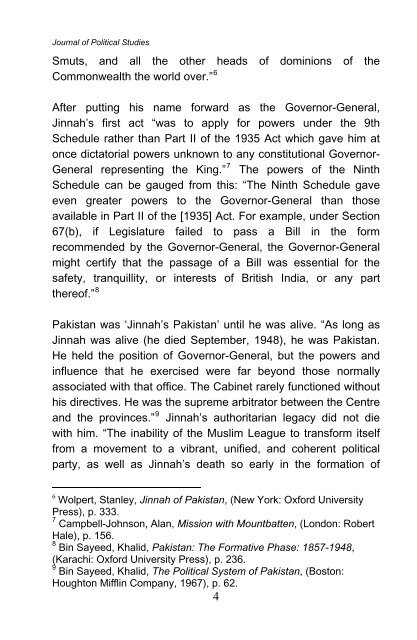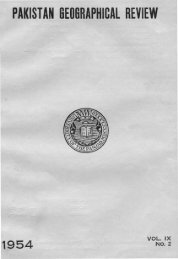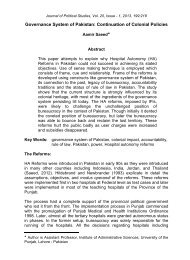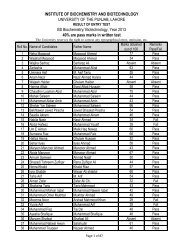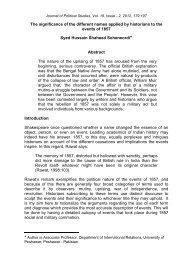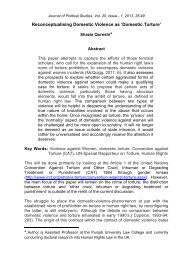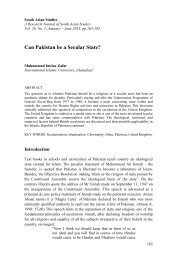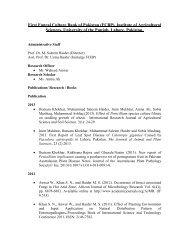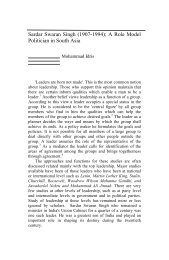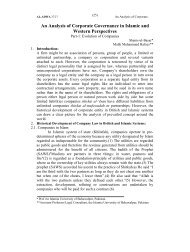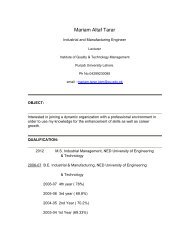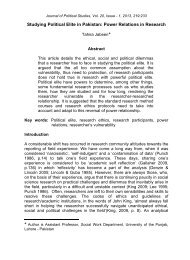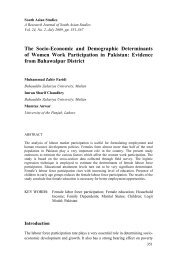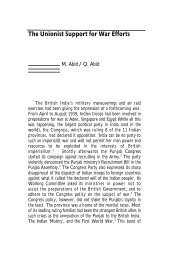Roots of authoritarianism in Pakistan-KU.pdf
Roots of authoritarianism in Pakistan-KU.pdf
Roots of authoritarianism in Pakistan-KU.pdf
Create successful ePaper yourself
Turn your PDF publications into a flip-book with our unique Google optimized e-Paper software.
Journal <strong>of</strong> Political Studies<br />
Smuts, and all the other heads <strong>of</strong> dom<strong>in</strong>ions <strong>of</strong> the<br />
Commonwealth the world over.” 6<br />
After putt<strong>in</strong>g his name forward as the Governor-General,<br />
J<strong>in</strong>nah’s first act “was to apply for powers under the 9th<br />
Schedule rather than Part II <strong>of</strong> the 1935 Act which gave him at<br />
once dictatorial powers unknown to any constitutional Governor-<br />
General represent<strong>in</strong>g the K<strong>in</strong>g.” 7 The powers <strong>of</strong> the N<strong>in</strong>th<br />
Schedule can be gauged from this: “The N<strong>in</strong>th Schedule gave<br />
even greater powers to the Governor-General than those<br />
available <strong>in</strong> Part II <strong>of</strong> the [1935] Act. For example, under Section<br />
67(b), if Legislature failed to pass a Bill <strong>in</strong> the form<br />
recommended by the Governor-General, the Governor-General<br />
might certify that the passage <strong>of</strong> a Bill was essential for the<br />
safety, tranquillity, or <strong>in</strong>terests <strong>of</strong> British India, or any part<br />
there<strong>of</strong>.” 8<br />
<strong>Pakistan</strong> was ‘J<strong>in</strong>nah’s <strong>Pakistan</strong>’ until he was alive. “As long as<br />
J<strong>in</strong>nah was alive (he died September, 1948), he was <strong>Pakistan</strong>.<br />
He held the position <strong>of</strong> Governor-General, but the powers and<br />
<strong>in</strong>fluence that he exercised were far beyond those normally<br />
associated with that <strong>of</strong>fice. The Cab<strong>in</strong>et rarely functioned without<br />
his directives. He was the supreme arbitrator between the Centre<br />
and the prov<strong>in</strong>ces.” 9 J<strong>in</strong>nah’s authoritarian legacy did not die<br />
with him. “The <strong>in</strong>ability <strong>of</strong> the Muslim League to transform itself<br />
from a movement to a vibrant, unified, and coherent political<br />
party, as well as J<strong>in</strong>nah’s death so early <strong>in</strong> the formation <strong>of</strong><br />
6 Wolpert, Stanley, J<strong>in</strong>nah <strong>of</strong> <strong>Pakistan</strong>, (New York: Oxford University<br />
Press), p. 333.<br />
7 Campbell-Johnson, Alan, Mission with Mountbatten, (London: Robert<br />
Hale), p. 156.<br />
8 B<strong>in</strong> Sayeed, Khalid, <strong>Pakistan</strong>: The Formative Phase: 1857-1948,<br />
(Karachi: Oxford University Press), p. 236.<br />
9 B<strong>in</strong> Sayeed, Khalid, The Political System <strong>of</strong> <strong>Pakistan</strong>, (Boston:<br />
Houghton Miffl<strong>in</strong> Company, 1967), p. 62.<br />
4


